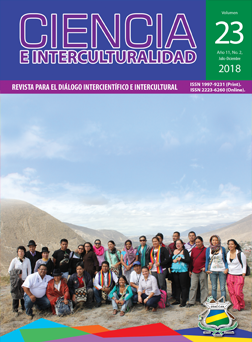El Rol de la Mujer en la Práctica del Trueque como un Proceso de Comunicación Propia
DOI:
https://doi.org/10.5377/rci.v23i2.6577Palabras clave:
Comunicación propia, Trueque, Rol de la mujer, Semillas nativas, Autonomía, Soberanía alimentaria, EducaciónResumen
El “rol de la mujer en la práctica del trueque como un proceso de comunicación propia”, es una investigación realizada en el Resguardo indígena de Kokonuko, Municipio de Puracé, Colombia, y contó con la participación de mayoras y mayores, jóvenes, niños, profesores, y autoridades del cabildo que hacen parte de esta comunidad. El propósito del estudio fue conocer las vivencias culturales, el sistema de la memoria cultural, y el testimonio vivo a través de entrevistas con representantes de familias de diferentes veredas que pertenecen al resguardo. Este trabajo pretende ser un camino que oriente los procesos educativos y a la comunidad misma. Esta investigación busca fortalecer el ejercicio ancestral de la práctica del trueque como una herramienta de seguridad, autonomía, soberanía alimentaria y territorial mediante la recuperación de prácticas ancestrales de la comunidad, focalizada en el rol que ejerce la mujer en una estrategia que evidencia el proceso de comunicación propia en el resguardo.Descargas
Los datos de descargas todavía no están disponibles.
Resumen
1046
1046
PDF 821
HTML 333
EPUB 154
Resumen (Audio) 146
Abstract (Audio) (English) 142
HTML 333
EPUB 154
Resumen (Audio) 146
Abstract (Audio) (English) 142
Descargas
Publicado
2018-10-22
Cómo citar
Avirama Calambas, L. M. (2018). El Rol de la Mujer en la Práctica del Trueque como un Proceso de Comunicación Propia. Ciencia E Interculturalidad, 23(2), 193–203. https://doi.org/10.5377/rci.v23i2.6577
Número
Sección
Género e Interculturalidad
Licencia
Copyright © (URACCAN)

Esta revista está bajo una licencia de Creative Commons Reconocimiento-NoComercial-SinObraDerivada 4.0 Internacional. Esta licencia permite que otros puedan descargar las obras y compartirlas con otras personas, siempre que se reconozca su autoría, pero no se pueden cambiar de ninguna manera ni se pueden utilizar comercialmente.




